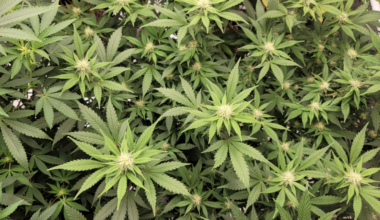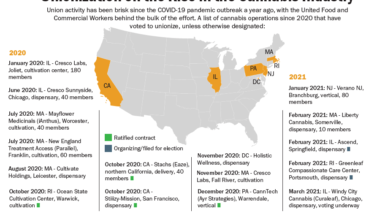A bipartisan bill to provide military veterans with access to medical marijuana was reintroduced in Congress on Thursday.
Reps. Earl Blumenauer (D-OR) and Brian Mast (R-FL), co-chairs of the Congressional Cannabis Caucus, are the chief sponsors of the Veterans Equal Access Act. The measure has been introduced several times in recent years with bipartisan support but has yet to be enacted.
The legislation is narrowly tailored, simply allowing doctors at the U.S. Department of Veterans Affairs (VA) to recommend medical marijuana to their patients in states where it’s legal. The sponsors recently urged colleagues to sign on to the legislation in a letter circulated to congressional offices.
Blumenauer acknowledges that some in Congress might not be ready to join the majority of Americans who support legalization, but said the incremental veterans reform is an example of legislation that could be enacted sooner rather than later.
“I think the prospects have never been better,” Blumenauer told Marijuana Moment in a phone interview on Thursday. “This is one where there’s overwhelming bipartisan support.”
“We have ill treated our veterans,” the congressman said. “There was a time when we passed out opioids to them like Tic Tacs while we denied them the ability to use their VA doctor to be able to deal with medical cannabis, which would have been safer and more effective.”
—
Marijuana Moment is tracking more than 1,500 cannabis, psychedelics and drug policy bills in state legislatures and Congress this year. Patreon supporters pledging at least $25/month get access to our interactive maps, charts and hearing calendar so they don’t miss any developments.![]()
Learn more about our marijuana bill tracker and become a supporter on Patreon to get access.
—
The reform, which is identical to committee-approved versions from past years and also cosponsored by Cannabis Caucus co-chair Rep. Dave Joyce (R-OH), was previously pursued through the appropriations process as an amendment.
But lawmakers have shifted gears to focus on the standalone bill following pushback from VA, which has consistently opposed modest marijuana reform proposals that relate to the department.
Mast, for his part, is a disabled veteran himself who was selected to co-chair the caucus after a prior GOP leader, Rep. Don Young (R-AK), passed away.
The Veterans Equal Access Act is an especially concise bill that would provide a modest but impactful reform for the veteran community.
It states that the secretary of VA must “authorize physicians and other health care providers employed” by the department to 1) “provide recommendations and opinions to veterans who are residents of states with state marijuana programs regarding the participation of veterans in such state marijuana programs” and 2) “complete forms reflecting such recommendations and opinions.”
VA doctors are currently allowed to discuss medical cannabis with patients, but they’re not specifically authorized to issue recommendations, even in states that have legalized the plant for medical or recreational use.
“This is something where the drumbeat is stronger,” Blumenauer said. “There’s a certain political potency—which I think people need to rediscover. People need to be more engaged politically. That’s part of what needs to happen.”
The Congressional Budget Office conducted a fiscal analysis of an earlier version of the bill in 2020, finding that it would not cost the government anything to implement.
Separately, there have reportedly been high-level talks in both chambers about advancing a package of incremental cannabis reform bills this year, including marijuana policy that pertains to veterans. It’s yet to be seen if that potential package would feature this veterans measure in particular.
The new standalone veterans bill has the support of several major cannabis and veterans advocacy groups, including Iraq and Afghanistan Veterans of America (IVAV), AMVETS, Veterans Cannabis Coalition, NORML, Drug Policy Alliance, Council for Federal Cannabis Regulation, U.S. Cannabis Council, Better Organizing to Win Legalization and National Cannabis Industry Association.
VA, meanwhile, has consistently testified against even modest bills aimed at encouraging it to conduct more research on the potential medical benefits of cannabis for military veterans.
The department also recently made clear that it won’t provide support for treatment involving marijuana as part of a new grants program aimed at preventing veteran suicide.
VA’s position on marijuana has been a source of consistent frustration for advocates and veteran service organizations who have been pushing for expanded research into the therapeutic potential of cannabis.
House and Senate committees held joint hearings in March to hear from veterans service organizations (VSOs) about how Congress and the federal government can better serve their constituents, and several of the groups brought up the need to ease restrictions on marijuana.
Separately, military veterans would be “encouraged” to discuss medical marijuana treatment without the fear of losing federal benefits under a bill sponsored by Rep. Seth Moulton (D-MA).
The main thrust of that legislation is to codify existing policies that allow VA doctors to talk about medical cannabis with patients as well as protections for veterans who are candid about their history with marijuana treatment. By doing so, it would enshrine these polices into law so that they could not later be changed administratively by future VA leaders.
Read the text of the veterans medical cannabis bill below:
Medical Disclaimer:
The information provided in these blog posts is intended for general informational and educational purposes only. It is not a substitute for professional medical advice, diagnosis, or treatment. Always seek the advice of your physician or other qualified healthcare provider with any questions you may have regarding a medical condition. The use of any information provided in these blog posts is solely at your own risk. The authors and the website do not recommend or endorse any specific products, treatments, or procedures mentioned. Reliance on any information in these blog posts is solely at your own discretion.







